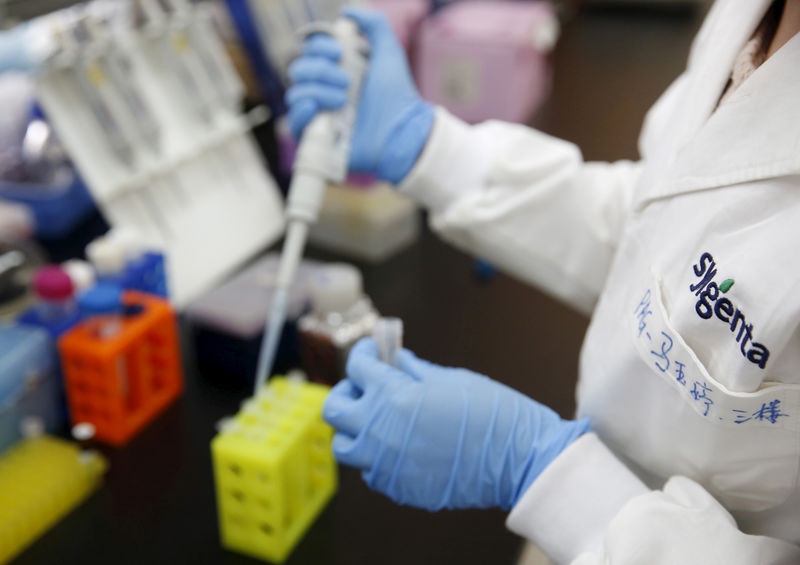By Dominique Patton
BEIJING (Reuters) - China approved five genetically modified (GM) crops for import on Tuesday, the first in about 18 months in a move that could boost its overseas grains purchases and ease pressure from the United States to open its markets to more farm goods.
The United States is the world's biggest producer of GM crops, while China is the top importer of GM soybeans and canola.
U.S. farmers and global seed companies have long complained about Beijing's slow and unpredictable process for approving GM crops for import, stoking trade tensions between the world's two largest economies.
The approvals, announced on the agriculture ministry's website, were granted while a U.S. trade delegation is meeting with its counterparts in the Chinese capital this week.
"It's a goodwill gesture toward the resolution of the trade issue," said a China representative of a U.S. agricultural industry association.
"It's been in the system for a long time but they chose today to release this good news," he added, declining to be identified due to the sensitivity of the matter.
The approved products included DowDuPont Inc's (N:DWDP) DP4114 Qrome corn and DAS-44406-6 soybean, known as Enlist E3, as well as the SYHT0H2 soybean developed by Bayer CropScience and Syngenta
The other two newly approved products - BASF's RF3 canola and Bayer-owned (DE:BAYGn) Monsanto's glyphosate-tolerant MON 88302 canola - had been waiting six years for permission.
The approvals came as farmers in North America were deciding which seeds to plant this spring. China before the trade war bought some 60 percent of U.S. soybeans and U.S. farmers do not widely plant varieties it has not approved.
The newly approved canola will allow farmers in Canada to boost production, according to Jim Everson, president of industry group the Canola Council.
"The industry expects growers will produce $400 million more canola every year using the same amount of land - a step-change for canola productivity," Everson said in a statement.
Five other products known to be seeking approvals were not given the green light, including two GM alfalfa products developed by Monsanto (NYSE:MON) and two DowDuPont soybean traits.
Corteva Agriscience, the agriculture unit of DowDuPont, said, "We are happy to see the regulatory approval of our seed traits progressing in China."
Bayer said in a statement it welcomed the news but noted "many of these products were stuck in China’s regulatory process for many years and others were not granted approvals, underscoring the need for continued improvement in China’s regulatory processes."
Chinese officials met their U.S. counterparts in Beijing on Monday for the first face-to-face talks since U.S. President Donald Trump and Chinese President Xi Jinping agreed in December to a 90-day truce in a trade war that has roiled global markets.
China had not approved any GM crops for import since July 2017, when it cleared two products following high-level talks with Washington. It also approved two products in June 2017.
China's scientific advisory board on GM crops met in June but did not give the go-ahead for imports of any products.
"China's approval of the new GMO products is paving the way for China to import large volumes of U.S. soybeans in the future. It is a positive signal," said Li Qiang, chief analyst with Shanghai JC Intelligence Co Ltd.
The truce in the Sino-U.S. trade war prompted a resumption of U.S. soybean purchases. Buying had slumped after China imposed a 25 percent import duty on U.S. shipments of oilseed on July 6 in response to U.S. tariffs.
ONLY A FRACTION
China does not allow the planting of genetically modified food crops, but imports of GM crops such as soybeans and corn for animal feed are fine.
The country, the world's biggest soybean consumer, has so far purchased only about 5 million tonnes of the 2018 U.S. soy harvest, a fraction of its typical purchases.
The United States has demanded that China change its GM crop import application process to make it more transparent, timely and based on scientific methods.
The latest approvals should not be taken as a sign that China is conceding to those demands, said a China-based industry source, who also asked not to be named because of the sensitivity of the matter.
"It's another piece of evidence that China's approval process is not entirely scientific but political," said the source, who also believed the approvals were timed for the trade visit.

The ministry also announced on Tuesday the extension of import approvals for 26 other GM crops by a further three years.